大学英语unit one 讲义
新视野大学英语第三版读写教程unit1讲义

新视野大学英语读写教程(第三版)讲义Book One Unit Two授课班级:___________授课教师:___________I. Warming-up Activities1. Preview and Lead-in (p2)2. Background Information (教参p2-3)American higher educationIn USA, students can choose to go to college after high school. (Or they can choose to go straight to the workforce after high school.) They have the option of attending a two-year community college before applying to a four-year university. Admission to community college is easier, tuition is lower, and class sizes are often smaller than at a university. Community college students can earn an associate degree and transfer up to two years of course credits to a university.College and university students need to pay tuition, but many earn scholarships or receive loans. Although admission policies vary from one university to another, most determine admission based on several criteria, including a student’s high school course of study, high school Grade Point Average (GPA), participation in extracurricular activities, SAT or ACT exam scores, a written essay, and possibly a personal interview with a representative from the admission office.Most students in USA take the SAT (known asScholastic Aptitude Test) or ACT (American College Testing) during their final year of high school. Each university sets a minimum SAT or ACT score that a student must achieve in order to gain admission. These are standardized quantitative examinations. The SAT tests critical reading, mathematics, and writing skills. The ACT tests English, mathematics, reading, and science reasoning, and includes an optimal writing test.Extracurricular activities may include scholastic clubs, athletic teams, student government, and philanthropic clubs. V oluntary participation in these kinds of activities is an indication that a student has learned valuable life lessons, such as teamwork, leadership, or civic responsibility.University students pursuing a bachelor’s degree are called “undergraduates”; students pursuing a master’s or doctoral degree are called “graduate students”.Most universities give undergraduate students a liberal education, which means students are required to take courses across several disciplines before they specialize in a major field of study. Graduate and professional programs, such as medicine or law, are specialized. All degree programs require students to complete a minimum number of credit hours in order to graduate.Selection for admission to a graduate program is based on several criteria. These include completion of a bache lor’s degree, the student’s undergraduate coursework and GPA. Students are also expected to write an essay as part of their application or to submit a writing sample. Most master’s programs require students to have a minimum score on the Graduate Record Examination (GRE), which tests verbal reasoning, quantitative reasoning, critical thinking, and analytical writing skills.Vera WangVera Ellen Want (王薇薇, 1949-) is a Chinese-American fashion designer. She was born and raised in New York City. While trained as a figure skater in high school, she eventually earned a degree in art history from Sarah Lawrence College in 1971. But a career in fashion was her dream. She worked as a senior fashion editor for V ogue (《时尚》杂志) for 15 years.In 1985, she left V ogue and joined Ralph Lauren as a design director for two years. In 1990, she opened her own design salon in New York, and featured her trademark bridal gowns. Wang has made wedding gowns for many well-known celebrities and public figures, such as Jennifer Lopez (珍妮佛·洛佩兹), Sharon Stone(莎朗·斯通), and Chelsea Clinton (切尔西·克林顿).3. Pre-reading Activities (Compound dictation)Universities are generally bigger, offer more __________ and do more research. Modern universities developed from those of the ______________ in Europe. The word “university” came from the Latin “universities.” This described a group of people __________ for a common purpose4. Video WatchingTopic i: How to enrich your campus life?As shown in the video, college is not only a place for us to get a degree but also a place for us to enrich our experience. For the sake of our healthy growth, in effect, every college campus in China is abundant with extra-curricular activities, such as mathematical modeling, English salon, dance training, sports center, and fine art clubs. An active participation in such activities can broaden our horizons, thus enabling us to pursue new passions. And best of all, we will form more firm bonds of friendship in the process that will blossom over many years.Topic ii: How to reap the most out of your campus life?How much we will reap from our campus life depends upon what we do from now on, as it is often said in our life that you will reap what you’ve sown. In order to avoid reaping nothing or even regret, I’d like to share with you my own plans:To keep up with the flow of my courses. If I fail to keep pace with my courses, as far as I know, I will stand little chance of reaping the most out of my campus life. So it is the bottom line of my campus life to keep in step with them. To be concrete, I will attend classes and hit textbooks in time so as to condition myself better for the exams in advance.To embrace the campus life with my whole being. Since there is a lot more to my campus life than passing exams, I will throw my heart into it and keep my curiosity as the best guide to my pursuits. If I sign up for model designing and making out of curiosity, for example, I believe I will reap a lot from a good combination of theory and practice;To get ready for new challenges. Readiness for challenges from, say, unknown fields of my interest will not only lead to growth in my abilities, but help find out my new passions as well. As the old Chinese saying I love most goes, “Success is always in favor of those who keep prepared for it”.5. Topic-centered study of new words and their use1.While many students felt ____________ in face of the challenge,he chose to rise to it.2.What you will achieve tomorrow has much to do with how muchknowledge you ___________ today.3.As you’ve made your ___________, so will you carry it out.4.Teaching resources are always __________ to those who are readyto make best use of them.5.With no compass in the ocean of learning, your __________ for itwill cool soon.6.The golden ____________, once lost, will never come by again.7.He who has lost ___________ can lose nothing more.8.What you will ___________ from your campus life rests with whatyou direct your efforts to now.9.What one finds ___________ now may turn out to be nothing buta waste of time in the future.10.Whereas some __________ joys of college life, others tasteregrets for it.II. Vocabulary Study1. pledge vt&n (fml. ) (尤指公开或正式作出的)誓言;誓约;保证[同近义词] promise; undertake; guarantee[搭配] pledge sth. (to sb./sth.)pledge to do sth. 保证去做…pledge thatpledge oneself to sth./to do sth. 保证某人做某事或支持某事[例句] The Government has pledged itself to send aid to the flood victims.2. routine n.常规,管理adj.惯常的;常规的;例行的[助记]:在route里面加了个in; 每天都在这条路线里走,就是日常的、例行的(routine)事情。
大一英语Unit One课件
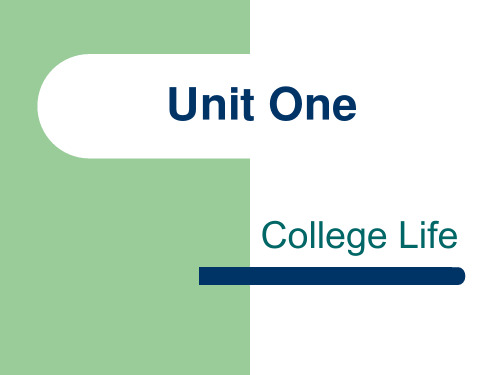
5. Conflict
1) n 矛盾,冲突 come into conflict with 和...冲突 in conflict with... 同...相冲突 2) vi.冲突;抵触;争执 E.g Your interests conflict with mine. 你的利益和我的冲突。
6. Enhance: vt. 提高,增加; 加强
7. Tempting: adj attractive吸引人的; 诱 人的
Translation:
1) 乍一看,会让人很想同意. At first glance, it would be tempting to agree.
8. Academic: adj 学院的;学术的;理论的
Translation: 1) 依我良好的学术背景,我能胜任。 With my strong academic background, I am competent.
explore the possibilities for improvement.探索改善的可能性
expend v.花费 extend v.延长,延伸 exploit v. 开采; 开发:剥削
Key Expressions in Use
1.
a myriad of 大量的,无数的
1) 无数想法划过她的心头。 A myriad of thoughts passed through her mind. 2)远处有无数盏灯像星星一样闪烁。 A myriad of lights twinkled like stars in the distance.
2) n 大学教师;高校科研人员
Academy: n 学院
9. Available: adj
现代大学英语第一册课件 PPT Unit One

Cling: to hold closely; to refuse to let go
He clung to the rope to keep from falling. Figurative meaning: cling to a purpose / outdated customs / the last hope
Байду номын сангаас
A matter of sth. / of doing sth.
a situation that involves sth. or depends on sth. E.g. Learning is a matter of seeing much, suffering much and studying much. Some people like pop music while others prefer serious music. It’s a matter of taste.
Vain: fruitless
In vain: without result e.g. Our labor was in vain. vain talk / a vain attempt / vain promises vain talker
Variety: quality of not being the same
现代大学英语第一册
杨立民
Unit 1
Half a Day
by Naguib Mahfous
Background Information
Naguib Mahfous 纳吉布•马福兹 纳吉布 马福兹
Naguib Mahfous is the first Arabian language author awarded the Nobel Prize in literature(1988). He has been described as the “Dickens”(迪更斯 1812-1870, 英国著名现 实主义小说家)of Cairo Cafés and the “Balzac” (巴尔扎克,1799-1850,法国著名小说 家)of Egypt.
大学英语教材讲义答案
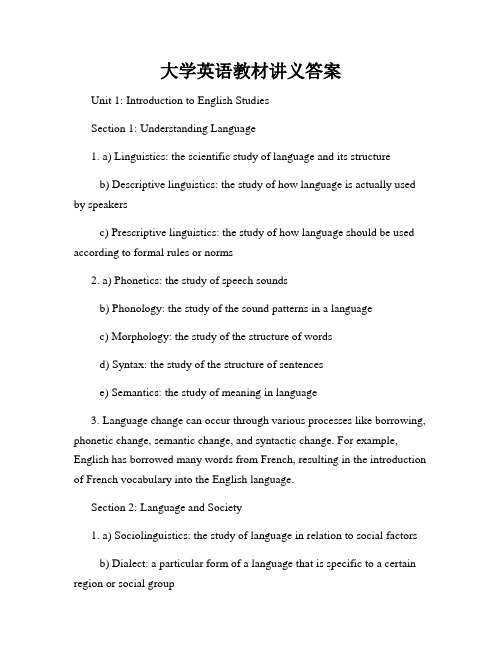
大学英语教材讲义答案Unit 1: Introduction to English StudiesSection 1: Understanding Language1. a) Linguistics: the scientific study of language and its structureb) Descriptive linguistics: the study of how language is actually used by speakersc) Prescriptive linguistics: the study of how language should be used according to formal rules or norms2. a) Phonetics: the study of speech soundsb) Phonology: the study of the sound patterns in a languagec) Morphology: the study of the structure of wordsd) Syntax: the study of the structure of sentencese) Semantics: the study of meaning in language3. Language change can occur through various processes like borrowing, phonetic change, semantic change, and syntactic change. For example, English has borrowed many words from French, resulting in the introduction of French vocabulary into the English language.Section 2: Language and Society1. a) Sociolinguistics: the study of language in relation to social factorsb) Dialect: a particular form of a language that is specific to a certain region or social group2. a) Regional dialects: variations in language based on geographic locationb) Social dialects: variations in language based on social factors like education, occupation, and class3. Code-switching is the practice of alternating between two or more languages or dialects within a conversation or sentence. It can be influenced by social factors, such as the desire to identify with a particular group or to express a specific emotion.Unit 2: Language and CommunicationSection 1: Principles of Communication1. a) Verbal communication: the use of words and language to convey a messageb) Nonverbal communication: the use of body language, gestures, and facial expressions to convey meaning2. a) Intrapersonal communication: communication that occurs within an individual's mindb) Interpersonal communication: communication that occurs between two or more people3. Effective communication involves clear and concise expression, active listening, and an understanding of the context in which the communication takes place.Section 2: Language Skills1. a) Listening: the process of receiving and interpreting spoken languageb) Speaking: the act of producing and verbalizing languagec) Reading: the process of understanding written languaged) Writing: the act of producing written language2. Language skills can be developed through practice and exposure to different types of texts and communication situations. Strategies such as active listening, note-taking, and extensive reading can help improve language skills.3. The four language skills are interconnected and mutually supportive. For example, reading can enhance vocabulary and comprehension skills, which in turn can improve writing abilities.Unit 3: Language and CultureSection 1: Language Variation1. a) Accent: the way speech sounds are pronounced in a particular geographical area or social groupb) Standard variety: the form of a language that is considered the norm or standard in a particular region or country2. World Englishes refers to the various forms of English spoken around the world, each with its own unique characteristics and features influenced by the local culture and language.3. Language attitudes can influence the perception and evaluation of different language varieties. Attitudes towards accents or dialects can vary, ranging from positive to negative stereotypes.Section 2: Intercultural Communication1. Intercultural communication is the process of exchanging information and ideas between individuals from different cultural backgrounds. It involves understanding and respecting differences in communication styles, values, and beliefs.2. Culture influences communication through language, nonverbal cues, and social norms. Different cultures may have different levels of directness in communication or variations in body language and gestures.3. Effective intercultural communication requires cultural sensitivity, empathy, and the ability to adapt and adjust one's communication style to accommodate cultural differences.Note: The above content is for illustrative purposes only and may not represent the complete answer key for a university English textbook.。
Unit one 重点词汇讲解- 新目标大学英语《综合教程》 第一册
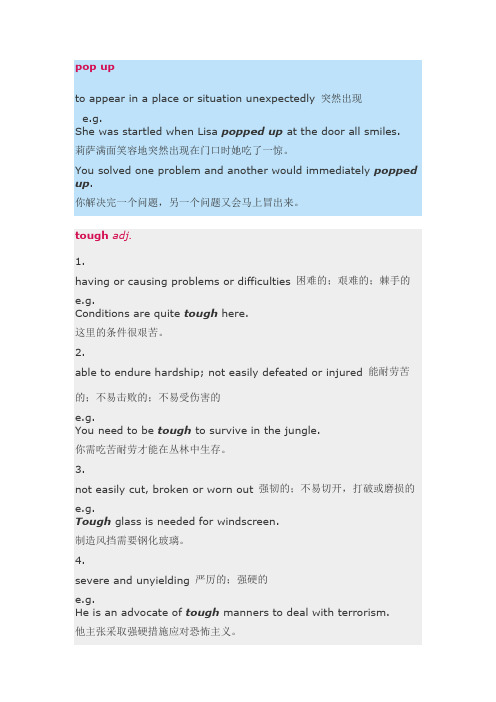
pop upto appear in a place or situation unexpectedly 突然出现e.g.She was startled when Lisa popped up at the door all smiles.莉萨满面笑容地突然出现在门口时她吃了一惊。
You solved one problem and another would immediately popped up.你解决完一个问题,另一个问题又会马上冒出来。
tough adj.1.having or causing problems or difficulties 困难的;艰难的;棘手的e.g.Conditions are quite tough here.这里的条件很艰苦。
2.able to endure hardship; not easily defeated or injured 能耐劳苦的;不易击败的;不易受伤害的e.g.You need to be tough to survive in the jungle.你需吃苦耐劳才能在丛林中生存。
3.not easily cut, broken or worn out 强韧的;不易切开,打破或磨损的e.g.Tough glass is needed for windscreen.制造风挡需要钢化玻璃。
4.severe and unyielding 严厉的;强硬的e.g.He is an advocate of tough manners to deal with terrorism.他主张采取强硬措施应对恐怖主义。
More examples:a tough game 激烈的比赛a tough journey 艰辛的旅程a tough assignment 棘手的任务a tough criminal 凶恶的罪犯a tough guy 一个硬汉a tough character 坚韧的性格a tough steak 咬不动的牛排be set on doing sth.to be determined to do sth. 决心做某事e.g.She was set on going to Paris to spend her vacation.她决意要去巴黎度假。
大学英语自学教程(上)讲义

Unit 1Text A How to Be a Successful Language Learner?搭配:1.wait for sb. to do sth. 等待某人做某事/动词词组2.look for sth./sb. 寻找某人或某物/动词词组3.make a mistake 犯错误/动词词组4.be afraid to do sth.害怕做某事/形容词词组5.be willing to do sth. 愿意做某事/形容词词组6.do sth. with a purpose 有目的地做某事/故意做某事/动词词组7.be interested in sth./sb. 对某人或某物很感兴趣/形容词词组municate with sb. 与某人交流/动词词组9.learn from sb. 想某人学习10.might do well to do sth. 最好做某事句型:1.S.+V.+it+adj.+to do sth. 形式宾语句型n.e.g. S ome people find it difficult to succeed in language learning.Some people find it difficult to succeed in other fields.They find it easy to practice using the language regularly.2.It is +adj.+for sb.+to do sth. 形式主语句型e.g. It is more important for them to learn to think in the language than to know the meaning of everyword.It is necessary for them to learn the language in order to communicate with these people and to learn for them.语言点:1.success(n.)-successful(adj.)-succeed(v.) 成功2.hundreds of people与eight hundred people:请注意有数词存在后,表量名词的变化。
大学英语精读第二册 Unit One
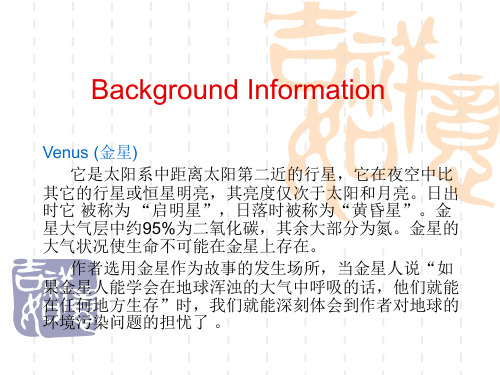
Consolated Edison Belt
(爱迪生联合电气公司带) 这是一个作者杜撰出来的名词,由人们熟悉的两 个名词范爱伦辐射带(Van Allen Belt)和爱迪生联 合电气公司(Consolated Edison)构成的。 范爱伦辐射带是指环绕地球的两个辐射区,它是 James 以首先发现这两个辐射带的美国科学家James A. Van Allen的名字命名的。爱迪生联合电气公司是 一个联合的电气公司群体。最大的一家是托马斯. 爱迪生所建。 这些电厂使用大量的煤炭作为燃料,造成这一地 区的严重的空气污染。作者杜撰这一名词表明如 果人类不注重环保,那么日后我们的地球上空将 有一个由煤灰和烟雾所组成的污染带。
Manhattan (曼哈顿)
纽约市的五大自治州之一,主要领土为曼哈顿岛。该岛于 1626年由荷属西印度公司从印第安人处购买,只用了价 值24美元的珠子,布匹和小饰物。之后在那里建起了一 座叫新阿姆斯特丹的城市。1664年英国人夺取该城,并 重新起名为纽约。 如今,曼哈顿有铁路,地铁,客机和轮渡等多种交通设备 外,还有7座桥梁以及4个地下通道与其他区以及新泽西 州相接。这里有世界上最活跃的码头,境内的摩天大楼包 括帝国大厦、世界贸易中心的高塔及克莱斯勒大厦。洛克 菲勒中心由16幢大厦组成,其中包括70层楼高的RCA大 厦。此外,还有联合国大厦、圆形竞技场展览中心以及麦 迪逊广场公园娱乐中心。
大学实用英语一UnitoneMyCollegeLife
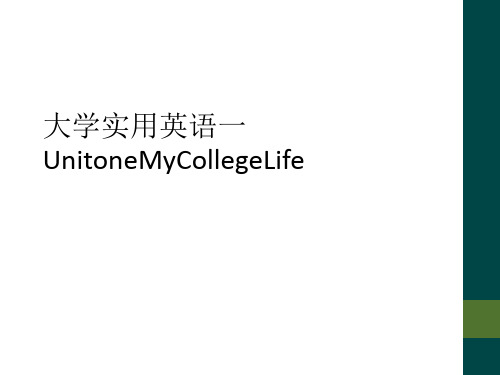
译文:通常,我单独一人在教室学习。
译文:这些活动总能激起我们的பைடு நூலகம்情,我们也 非常愿意参加,从中我们获益良多。
Para 3
3 Besides, we have to learn how to look after ourselves.
besides: 除此之外;此外,而且 look after (oneself): 照顾,照看〔某人自己〕
enrich/ɪnˈrɪtʃ/
释义:〔及物动词〕使富裕/丰富,使充实
enrich our life 使生活丰富多彩。
enrich the language 充实语言
addition [ə'dɪʃ(ə)n]
词源: add〔动词〕增加;添加 — addition 〔名词〕增加;增添
释义1:〔名词〕加法 addition and subtraction 加减法 释义2:〔名词2〕补充 in addition另外,此外 释义3:添加物
sources. 这些数据是从各方面搜集来的。
campus ['kæmpəs]
释义:〔名词〕大学或学院的校园
campus life 校园生活
arouse [ə'raʊz]
释义:〔及物动词〕唤起;引起;激发
to arouse one from a deep sleep 从沉睡中唤醒某人
enthusiasm [ɪn'θjuːzɪæz(ə)m]
积累经历 Experience is the mother of wisdom.
经历为智慧之母。 释义2:〔及物动词〕经历,体验 experience pleasure/pain
新视野大学英语第三版第三册 unit 1 Section B讲解

way through high school. (Para. 2) 解释:
Becaan
normal kids during his childhood, Les was sent to
the classes specially set up for those with learning
1. Why was Les Brown placed in special
education classes? (Para. 2)
Tips
Because of his overactive behavior and nonstop talking as a child, Les was placed in special education classes for the learning disabled all the way through high school.
Background information
2. What is special education?
Tips
Special education refers to educational services for disabled students and students who have difficulty learning at the usual rate.
1. Who is Les Brown?
Tips
Les Brown is a motivational speaker, former Ohio politician, popular author, radio DJ, and former host of The Les Brown Show. As a politician, he is a former member of the Ohio House of Representatives. As a motivational speaker, he uses the catch phrase, “It’s possible,” and teaches people to follow their dreams as he learned to do.
大学英语-第一单元-Unit-1-Hello--Hi!ppt课件

2 Task: Exchange business cards with Mr. Green.
3 Task: Introduce an English teacher to your classmate.
4 Task: Greet your business partner, Mr. Johnson, at a trade fair.
Following Sample Dialogues Imitate and Perform
Putting Language to Use
.
Speak and Complete Speak and Communicate
Unit | One
SECTION I Talking Face to Face
Jack: Thank you. Here is my business card.
Li Tiegang: Thanks. This is mine.
.
Unit | One
2) Meeting People Again Lu Yang: Hi, long time no see, Mike. Do you remember me? Michael: Oh, it's you, Professor Lu. How nice to see you again. How are you? Lu Yang: Very well, thank you. How is your project? Michael: It's going fine. I'm here to present the project report. Lu Yang: Good. I'm also here for the conference. Michael: Really? It's a small world.
unit one 讲义
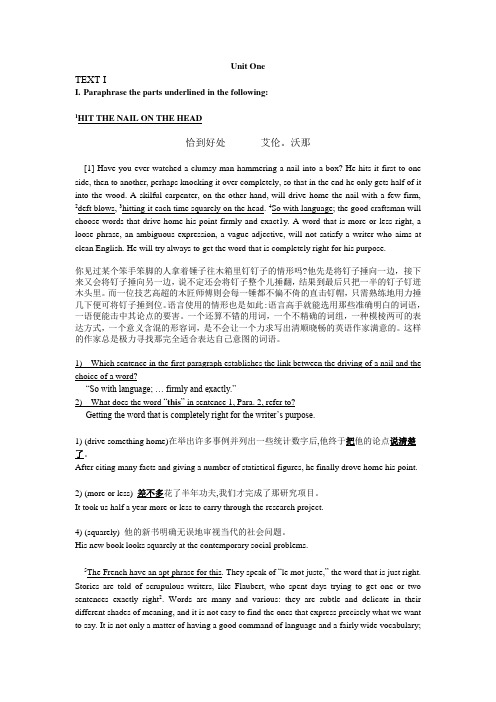
Unit OneTEXT II.Paraphrase the parts underlined in the following:1HIT THE NAIL ON THE HEAD恰到好处艾伦。
沃那[1] Have you ever watched a clumsy man hammering a nail into a box? He hits it first to one side, then to another, perhaps knocking it over completely, so that in the end he only gets half of it into the wood. A skilful carpenter, on the other hand, will drive home the nail with a few firm, 2deft blows, 3hitting it each time squarely on the head. 4So with language; the good craftsman will choose words that drive home his point firmly and exact1y. A word that is more or less right, a loose phrase, an ambiguous expression, a vague adjective, will not satisfy a writer who aims at clean English. He will try always to get the word that is completely right for his purpose.你见过某个笨手笨脚的人拿着锤子往木箱里钉钉子的情形吗?他先是将钉子捶向一边,接下来又会将钉子捶向另一边,说不定还会将钉子整个儿捶翻,结果到最后只把一半的钉子钉迸木头里。
unit 1大学英语视听说课件第一册
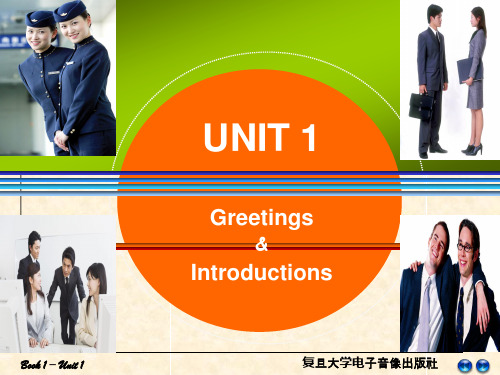
Section One
Dialogue 4 A) He has no idea about it. B) He’s quite interested in it. C) He enjoys it. D) He doesn’t like it.
Intensive Listening
√
B) David’s teacher. D) David’s friend.
4. How long has David played soccer? A) One year. B) Few years. C) Two years. D) Many years.
√
good5. Why do they have to say good-bye to Miss Smith? A) Because they will have a party. B) Because they will have a soccer match. C) Because they will attend a class. D) Because they will watch a play.
Book 1 – Unit 1
Section One
Dialogue 2
Intensive Listening
√
A) Interesting. C) All right.
B) Uninteresting. D) Too bad.
M: How's life, Kate? All right? W: Yes, not too bad, thanks. I’m a bit fed up with (厌倦) revising though. Are you? Question: How does the woman think of her life?
现代大学英语口语(1)UnitOne精品PPT课件

Vocabulary-building
• Text One
• TV series and movies:Prison Break, Lost, Ugly Betty,
• The Big Bang Theory, Home of Lies, Friends, American Got Talents, Brave Heart, Forrest Gump…
• others:Wild China, CCTV Speaking Contest, 21st Century Speaking Contest, New concept English, BBC Documentary, Discovery…
•
添加视频
课程考核
• 1. 形成性考核
•
形成性考核占课程总成绩的30%,成绩根据
个人课前展示、在口语课上的综合表现以及参加
小组活动和其他学习中心组织的活动的情况综合
而定。
• 2. 总结性考试
•
期末考试成绩占课程总成绩的70%。考试形式
待定。
Unit One
First Day in College
• Go ahead表示允许或者鼓励别人的用语。
• How are you!
• hello • 建议阅读:《最容易搞错的英语文化常识268例》,汪
静主编,天津科技翻译出版公司,2009,9.
• 3.话题讨论:通过对不同话题的讨论加深对英、美等主 要英语国家文化背景和生活习俗的了解,学会在具体语 境中进行正确得体的交际
Note:We introduce people who don’t know each other and we introduce ourselves to people who don’t know us.We can do this either in a formal way or in an informal way.When introducing people,we must follow the rule:a man is introduced to a woman,unless he is much older and more senior,young men are introduced to older men, and young women to older women.
上外全新版大学英语综合教程讲义-book2-unit1

Unit One Ways of LearningTeaching Objectives of this Unit:Students will be able to:1.grasp the main idea (that it would be ideal if we can strike a balance between the Chinese andthe Western learning styles) and structure of the text (introduction of the topic by an anecdote―elaboration by comparison and contrast― conclusion by a suggestion);2.appreciate the difference between comparison and contrast, as well as different ways to compareand contrast (point-by-point method or one-side-at-a-time method);3.master the key language points and grammatical structures in the text;4.conduct a series of reading, listening, speaking and writing activities related to the theme of thisunit.Previewing Tasks:T asks Ss to:1.get familiar with the following important words and expressions in Text A, which will enablethem to understand the text better: attach, initial, occasion, neglect, relevant, accomplish, in due course, make up for, continual, evolve, emerge, superior;2.pre-read Text A and try to find out the differences in education between China and America. Ssare also encouraged to collect more information on this issue from some after-class materials; 3.finish the comprehension questions for text organization on p. 10 of the textbook.First Period(90minutes)I. Cultural Notes:(1) Middle-class American: the old urban middle class consisted mainly of white collar workers and owners of the family businesses and their employees. They focused the majority of the middle class before 1945. The new middle class emerged out of the ashes of wartime destruction and consisted of salaried workers, blue collar, white collar, store clerks, shop keepers, regardless of the line of business they were in, all joined the ranks of the new middle-class which is between the very wealthy class and the class of unskilled laborers and unemployed people.(2) Standing on the shoulders of giants: a well-known phrase frequently employed by inventors to express modesty about their achievements. The suggestion is that while they have been able to see further than those who came before them, it is not because they themselves are intellectual giants. Rather it is because they have been able to build upon the accumulated discoveries of their great predecessors.II. A discussion for leading to Text A:1. If you find a two-year-old boy is trying to put a key into a box, will you help him immediately?---- Of course. He is too small to know how to do it---- No. let him do it and learn by trying.2.Can you recall how your parents taught you in your childhood? Did they like to teach you by holding your hand?---- (stories in their childhood)----Yes, I like it. I knew nothing as a little child and their help could give me a convenient way to achieve what I wanted.---- No, I don’t like it. Doing by myself could help me to grasp the things tightly.3. Which way did you prefer when you were in trouble with one of your toys in your childhood, turning to your parents for help, or exploring by yourselves?---- turning to my parents for help, because I was too young to know how to manage it.---- exploring by myself, like Kevin in Home Alone.4.Can you list some features of education in China based on the above discussions? Can youIn a broad sense, education is a kind of cultural phenomenon. Therefore, when we compare Sino-American education systems, it is indispensable to investigate the two cultures first, for it is the different cultures that lead to the differences in education. Knowing that, on the one hand, the core of Chinese education, though in varied forms, is given to the accumulation of knowledge and the construction of learning system and the aim of education is in molding, while on the American side, priority is given to fostering student’s ability to make practical application of knowledge learnt and boldness in innovations, creativity, originality, and the aim of its education is in perfection of his/her personality for the future happiness, you’ll find it is not hard to understand such common occurrences in text A or in daily life as why many Chinese staff would like to assist Benjamin to insert the key into the slot.III. Text Organization (exercise on P. 10):An essay is usually made up of three parts: a beginning where the topic is introduced; the body part where the topic is elaborated on, and a conclusion. This text is no exception:Part one: (Para.1—5) Topic introduced by an anecdote of teaching a child to insert a key into a slot. Part two: (Para.6—12) The differences in education between China and America.Point 1: Two different ways to learn to accomplish a task (Para.6—10)Point 2: Two different attitudes to creativity and skills (Para 11—12)Part three: (Para. 13—14) Conclusion: The author suggests that we might strike a better balance between the two contrary ways of education.(Teachers can draw the following chart on the blackboard to help the students be clear of the structure of Text A :)Chinese way↗↘Incident →→→difference in education →→→ conclusion↘American way ↗IV. Study in detail:Part one (Para. 1-5):1.Skimming: T asks Ss to skim this part and then answer the following questions:① Where and when did the incident take place? (Jinling Hotel in Nanjing, spring 1987)② Who are the main characters in this incident? (The author, his wife Ellen, their son Benjamin and the hotel staff)③ What is the attitude of the author and his wife towards Benjamin’s efforts in inserting the key into the slot? (They let him explore and enjoy himself)④ What is the attitude of the hotel staff toward Benjamin’s efforts? (They held his hand and taught him how to insert the key correctly)2. Language points in this part:1) reflect on: think deeply about, remind oneself of, considerI need time to reflect on your offer.2) attach: fasten or joinThe porter attached a label to my suitcase.She was strongly attached to her home.3)…to position the key just so:to position the key carefully to fit into the narrow key slot4) not in the least: not at allAnn didn't seem in the least concerned about her study5) on occasion: now and thenSteve spent almost all his time doing his research, but, on occasion, he would take his son to see a film.6) relevant: directly connected with the subject (followed by to, opposite irrelevant)Be related to / be associated with / be connected with / be concerned with7)assist: help (used in the pattern: assist sb. to do sth. , assist sb. with sth. )The head teacher’s deputy assists with many of his duties.3. T tells Ss that there are many ways of introducing a topic: ① to state the topic directly; ② to introduce the topic by posing a question (e.g. Text A, Unit 6, Book1: What Animals Really Think?);③to begin by quoting newspaper headlines (e.g. Text B, Unit 3, Book 1: How to Make Sense out of Science); ④an anecdote or an incident is used. Ss should decide which way is adopted by Howard Gardner, and T should drive home to them the very important point that they should learn to vary their own writing by adopting various types of topic introduction.V. Assignments:1. read the left two parts of text A in detail, pick out the sentences that can not easily understand.2. finish exercise 2 on P. 11, so as to get a better understanding of the differences in approaches to learning between the Chinese and Americans.Second Period (90minutes)I. Dictation:In a broad sense, education is a kind of cultural phenomenon. Therefore, when we compare Sino-America education systems, it is necessary to investigate the two cultures first, for it is the different cultures that lead to the difference in education. The Chinese give great priority to showing a child how to accomplish a task; In contrast, the Americans attach much importance to fostering students’ ability to make practical application of the knowledge and to encouraging them to be bold in innovation, creativity and originality.II. Part two:1. T asks Ss to scan this part quickly and then try to figure out the structure of this part:Para. 6-7: different explanations of the Chinese and the Americans for helping the children(Chinese: accomplish the task sooner, and they can proceed to more complex activities; Americans: self-reliance is a principle value of child rearing in middle-class American.)Para. 8-10: two different ways to learn.Para. 11-12: two different attitudes towards creativity and skills.2. T guides Ss to further discuss the differences in detail (check of assignment No.2):In this part, the author just gives his own thoughts on different approaches to leaning in China and the West based on the anecdote mentioned in the first part. Ss are supposed to sum up the differences in approaches to learning between the Chinese and Americans, including the two different ways to learn and two different attitudes towards creativity and skills as suggested by thecontrast (a comparison brings out the similarities between two or more things of the same kind, while a contrast the differences between them).3. T further explains to Ss that there are generally two ways to organize comparison and contrast in essays. One way is to examine one subject thoroughly and then start the other (one-side-at-a-time method), and the other way is to examine two subjects at the same time, discussing them point by point (point-by-point method). Then T asks Ss to scan Para. 6-7 and Para.11-13 respectively and decide what method of comparison and contrast are used here (one-side-at-a-time method for Para. 6-7 and point-by-point method for Para.11-13).4. Language points in this part:1) accomplish: manage to do (sth.)Unless you practice you’ll accomplish nothing.2) continual: describing separate actions which are repeated over a period of time.Recently the young couple have continual arguments with each other for trifles.continuous: indicating that an action carries on without stopping or interruptionA continuous beach is exposed to the beating of continual waves.3) apply: ① be relevant; have an effect ( used in the pattern apply to sb/sth)The principle of diligence applies to all undergoing② write a letter or fill in a form in order to ask formally for sth. (used in the pattern: apply for sth.. apply to do sth.)4) evolve: (cause to) develop gradually ;( used in the pattern evolve into, evolve from)The story evolves into a tragedy.Popular music evolves from folk songs.5) emerge: come out (followed by from)Emergence, n.出现emergency, n. 紧急情况,不测事件,非常时刻6) Sentences:① He may well get frustrated and angry. (line 39)may或might与well连用,表示有充分的理由,完全(能),(满)可以。
《大学英语3》Unit 1 讲义

Unit 1 Career CompetenciesText A New Words and Expressions1.c ooperative adj. willing to cooperate (cooperate v.\cooperation n.)e.g. 1)Thank you for your cooperative efforts.2)The school is very cooperative when we made a film there.2. committed adj. (commit a crime\suicide; commit to sb. or sth. = be loyal to)e.g. 1)a committed member of the party.2)We are committed to improving services. (be committed to 决心;致力于)3. employment n. (employ vt.-employer n.-employee n.- unemployment)e.g. 1) How many people does the company employ?2) employment rate; unemployment rate4. impress vt. (impressed a.\impressive a.\impression n.)e.g. 1) His sincerity impressed me.\ He impressed me with his sincerity.\I was impressed by his sincerity.2) She was very impressive in the interview. =The interviewer was impressed by her performance.5. appear vi. (disappear vi.\appear to do)e.g. 1) We expected him, but he never appeared.2) She appeared not to know what was happening. (seemed)3) It appears that he was asleep. (seemed)6. distract vt.e.g. 1) Don’t distract the driver when he is driving.2) A noise outside distracted her.7. differ vi. ∽from \ be different frome.g. 1) Tastes differ.2) French differ from English in this respect. = French and English differ in this respect.8. impose on \upon sb.\ sth. 利用;把…强加于;欺骗e.g. 1) Tim never says “No”, so people are always imposing on him.2) She realized that she had imposed on Miss Smith’s kindness.9. demonstrate vt. showe.g. 1) This research demonstrated the need to treat cancer early.2) John demonstrated to us how to use the computer system.3) He has demonstrated an ability to do the job well.10. dedicate oneself\one’s life to sth.e.g. 1) She dedicated herself to her work.2) He dedicated his life to the poor.。
新视野大学英语第一册unit1讲义
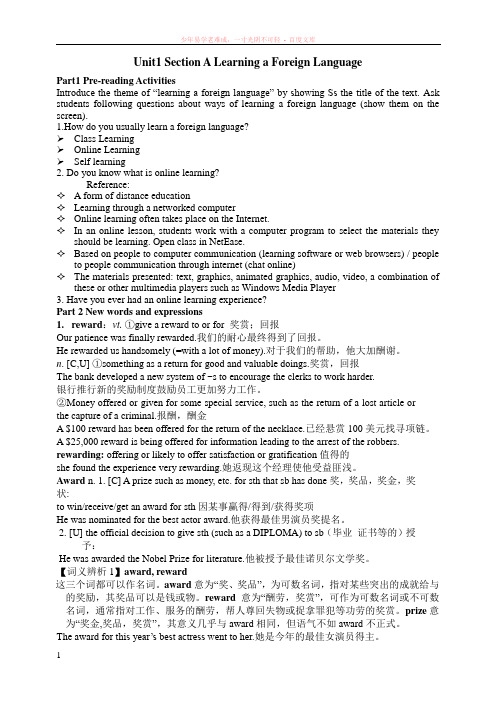
Unit1 Section A Learning a Foreign LanguagePart1 Pre-reading ActivitiesIntroduce the theme of “learning a foreign language” by showing Ss the title of the text. Ask students following questions about ways of learning a foreign language (show them on the screen).1.How do you usually learn a foreign language?➢Class Learning➢Online Learning➢Self learning2. Do you know what is online learning?Reference:He was nominated for the best actor award.他获得最佳男演员奖提名。
2. [U] the official decision to give sth (such as a DIPLOMA) to sb(毕业证书等的)授予:He was awarded the Nobel Prize for literature.他被授予最佳诺贝尔文学奖。
【词义辨析1】award, reward这三个词都可以作名词。
award意为“奖、奖品”,为可数名词,指对某些突出的成就给与的奖励,其奖品可以是钱或物。
reward 意为“酬劳,奖赏”,可作为可数名词或不可数名词,通常指对工作、服务的酬劳,帮人尊回失物或捉拿罪犯等功劳的奖赏。
prize意为“奖金,奖品,奖赏”,其意义几乎与award相同,但语气不如award不正式。
The award fo r this year’s best actress went to her.她是今年的最佳女演员得主。
大学英语1读写教程unit-1单词讲义

1. reward: vt. give sth in return for good and valuable doings.eg. The father rewarded the little boy for cleaning his room.Finally, his hard work was rewarded .reward: n. [C, U] sth as a return for good and valuable doings.eg. The bank developed a new system of rewards to encourage the clerksto work harder.This game had its excitement, challenges, and rewards. rewarding: adj. satisfying and worthwhileShe found the experience very rewarding.Teaching is a rewarding career.2. frustrate: vt. 1) Cause someone to have feelings of disappointmenteg. She was frustrated by her failure in the college entrance exam.2)Cause the failure of stheg. His attitude frustrated our plan.Thick fog frustrated their attempt to land on the tiny island. frustrating: adj. Making someone feel annoyed, upset, or impatienteg. It’s frustrating when you’re in a hurry and the traffic isn’t moving.Many of the things that my father finds frustrating are exactly whatmy mother finds most rewarding.3. be worth sth / doing stheg. The beautiful town and lovely beaches were well worth the 45-minute drive from our cottage.He’s decided to have a look at the house for it is well worth buying.4. junior: adj. having a low position, level, or rankeg. She started as a junior reporter on a local newspaper.His job is to give instructions to people junior to him.5. senior: adj. having a higher position, level or rankeg. They have got effective support from the senior management of the college.His position is senior to me.6. while: conj.Eg. While I like him personally, I don’t think what he’s doing is right.While professors are talking about economic theories, company chairmen areconcerned with profits.7. former: adj. of an earlier period;n. the first of the two.eg. The coal industry is now hardly half its former size.Of the two possibilities, the former seems more likely.8. not only … but also…: when you put “not only” at the beginning of a sentence, thesentence order should be inverted.eg. Not only did he finish his homework, but he also cleaned the room.Not only are housewives not paid, but also most of their boring work is unnoticed.9. unlike: prep. Not like, different fromeg. Unlike me, my son likes to get up early.10. far from: not at alleg. Far from (being) angry, he is very happy.Far from helping the situation, you’ve just made it worse.11. though: adv.eg. Learning English is a hard work, I enjoy it, though.I can’t go shopping with you. I can give you a ride to the department store, though.12. intimidate: vt. Create a feeling of fear in sbeg. He said he would never be intimidated by his opponent’s power.He’s being kept in jail until the trial so that he can’t intimidate any of thewitnesses.13. medium: n a method for giving informationadj. of middle size, amount, or qualityeg. TV has become the most important medium.She was of medium height and medium build.14. access: 1) the right to have or use sth;2) the means of entering a placehav e / get / obtain access to…eg. If you don’t have access to the internet, we’ll send someone to help you.The soldiers guarded the only access to the building.15. virtual: 1) created by computer to be similar to the experience of real life2) Almost what is stated.eg. Virtual communitiesVirtual classroomsFinding a cheap place to rent is virtually impossible in this area.16. commitment: 1) the hard work and loyalty2) a promiseeg. It is a part-time program, but total commitment is still necessary for completing it.He made a commitment to help all children learn English, but he soonfound it impossible without an online course.17. keep up with: keep the same speed as…eg. I am having trouble keeping up with the rest of the class.It’s important to keep up with the changes of the time.18. minimum: adj. the least, or the smallest possiblen. the smallest amounteg. The local shop paid him the legal minimum wage, but worked him twice the legal number of hours.The hospital has reduced staffing to an absolute minimum.19. feel like sth; feel like doing stheg. After lying in bed for a whole day, I feel like a walk.Let it go, he thought. He didn’t feel like arguing.20. think out: consider carefully about the details of stheg. He chewed at the end of his pencil, thinking out the next problem.The book is well thought out.21. post: vt. Put up sth on a screen, wall, or notice boardeg. The internet will allow people who want to offer their help to post their name on a website.I will post a notice on the bulletin board to let others learn about it.22. come across: meet or find by chanceeg. I did not come across a bit of difficulty while taking the exam.The young man would get nervous every time he came across a girl.23. reap: vt. 1) get sth, esp. sth good, as a result of what one has done.2) cut and gather a crop of graineg. After seeing my friend reap the benefits of hard study, I now believe that hard work pays off.Farmers are reaping rice in the field.24. trade for: exchange foreg. He decided to trade his car for a truck.I would trade my dictionary for your book.25. insight: [C, U] an accurate or deep understanding of stheg. Studying science gave me great insights into natural law.We help troubled teenagers gain some insight into their own problems.26. now that: because ofeg. Now that John has arrived, we can begin our class.My oldest son and I are getting along better now that he’s getting ready togo to college.27. reach out to: communicate with; contacteg. With the introduction of the Internet, we can reach out to our friends by email.compare:1)Reach out for: try to geteg. Y ou must reach out for any opportunity that comes your way.2)Reach for: hold out one’s hand to get stheg. He reached for the phone and dialed the number.28. bridge the gap: reduce or get rid of the difference between two things.eg. Learning a foreign language helps us bridge the gap between two different cultures.He bridges the gap between ballet and modern dance.词语的活学活用1.很值得去努力to be well worth the effort生活中并非一切都值得我们去冒险。
最新全新版大学英语(第二版)听说教程听力unit1教学讲义PPT课件
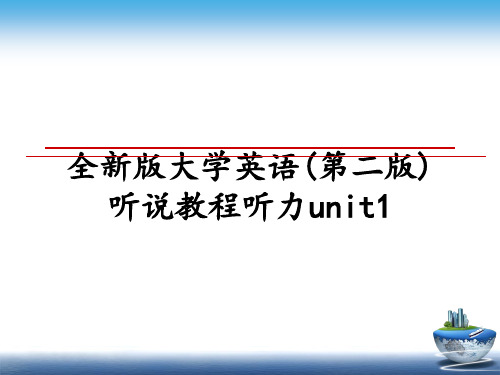
As far as I am concerned, I think the development of the Internet technology has shortened the geographical distance among people all over the globe. This increasing interconnectedness among people in different regions, countries and even continents has gradually rendered the world we live in as One World, in which people of different backgrounds can communicate with each other in no time at all. Take online education as one example, since there is no time and space limitations in an online class any more, a Chinese student can enroll in
Unit 1 One World
2. Do you think people all over the world are largely similar? Why or why not?
- 1、下载文档前请自行甄别文档内容的完整性,平台不提供额外的编辑、内容补充、找答案等附加服务。
- 2、"仅部分预览"的文档,不可在线预览部分如存在完整性等问题,可反馈申请退款(可完整预览的文档不适用该条件!)。
- 3、如文档侵犯您的权益,请联系客服反馈,我们会尽快为您处理(人工客服工作时间:9:00-18:30)。
Unit One Vacations That Nurture a Sense of Place Warm-up Activities1. Lead-in questions1) Do you miss your hometown if you are not a local resident in Shijiazhuang? Apart from your parents or other people you know, is there anything of your hometown that you miss a lot? Which is the place that you want to visit the most besides your own home?2) Have you ever been back to your senior middle school? How do you feel when you saw your old campus again? If not, what is the first thing that pops up in your mind when you think of your middle school?2. Make up a conversationDirections: Imagine you are back to your middle school campus with one of your classmates. Make up a conversation with your partner and try to involve the following information.A: how much do you remember of your campus and its school buildings.B: try to recall your interesting, delighting, depressing, embarrassing experiences on the campusC: would you come back again and explain whyBackground Knowledge1. Sense of PlaceIt is a combination of characteristics that makes a place special and unique. Due to those characteristics, you may hold some very special feelings or perceptions towards this place while others do not. Sense of place may involve your personal experience in a place, such as working in it in all weathers; make a living from it, suffering from its catastrophes, loving its beautiful mornings and evenings, investment of labor and feeling into it made by you, your parents, your grandparents or even your all-but unknown ancestors. The sense of place may also grow from your knowledge of this place and its folklore. For example, the relatives of the passengers aboard MH370 flight may have developed a sense pf place towards Malaysia.2. Sentimental JourneyA sentimental journey is a visit to a place that was once very familiar and that brings back memories of the past. For example, they have taken a sentimental journey to Britain where they had met and fell in love.3. Congregationalism and Congregational ChurchCongregationalism speaks of a form of church government. A congregational church is ruled by the congregation of its members, instead of by bishops or a group of elders. Congregational churches nearly always avoid hierarchy in churches, maintaining that the local church is answerable directly to God, not some man or organization.4. American Colonial ArchitectureAmerican colonial architecture includes several building design styles associated withthe colonial period of the United States, including First Period English, French Colonial, Spanish Colonial, Dutch Colonial, etc. These styles are associated with the houses, churches and government buildings of the period from about 1600 through the 19th century. For example, In New England, 17th-century colonial houses were built primarily from wood, following styles found in the southeastern counties of England. Dutch Colonial structures, built primarily in the Hudson River Valley, Long Island, and northern New Jersey, reflected construction styles from Holland and Flanders and used stone and brick more extensively than buildings in New England.Words for Pleasure1. Nurture1) to care for and protect sb/sth while they are growing and developing 养育,养护Parents want to know the best way to nurture and raise their child to adulthood.父母们想了解把他们的孩子养育成人的最好方法。
These delicate plants need careful nurturing in the greenhouse.这些幼嫩的植物需要在温室里精心培育。
The study looks at ways parents nurture their children.这项研究着眼于父母养育孩子的方法。
2) to encourage a feeling, an idea, a plan or a connection to develop, to encourage sb and help them to succeed 培养,促进,助长To nurture a hope 滋生出愿望To nurture young writers 培养青年作家To nurture the children’s curiosity and creativity 培养孩子的好奇心和创造力To nurture a good relationship with one colleagues 和同事建立良好的关系She had always nurtured great ambitions for her son.她一直在培养她儿子的雄心大志。
She secretly nurtured a hope of becoming famous.她暗暗滋生出成名的愿望。
Their political views are nurtures in the sixties.他们的政治观点形成于60年代。
2. Sentimental1) connected with your emotions 情感上的She kept the letters purely for sentimental reasons.她纯粹是处于情感原因保存这些信件。
The stolen items were of great sentimental value to the family.被偷的物品对这个家庭有极大的情感价值。
2)producing emotions such as pity, romantic love or sadness, which may be too strong or not appropriate; feeling these emotions too much伤感的,煽情的,多愁善感的A sentimental songA sentimental bookA sentimental filmA sentimental love storyA sentimental girlI tend to get very sentimental when I think of my childhood.我总是一想到我的童年就感伤不已。
